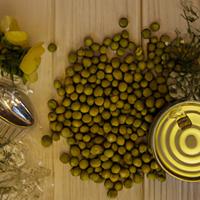
1 serving (160 grams) contains 80 calories, 5.0 grams of protein, 0.5 grams of fat, and 14.0 grams of carbohydrates.

Log this food in SnapCalorie

Nutrition Information
Calories |
118.3 | ||
|---|---|---|---|
% Daily Value* |
|||
| Total Fat | 0.7 g | 0% | |
| Saturated Fat | 0.1 g | 0% | |
| Polyunsaturated Fat | 0 g | ||
| Cholesterol | 0 mg | 0% | |
| Sodium | 443.6 mg | 19% | |
| Total Carbohydrates | 20.7 g | 7% | |
| Dietary Fiber | 5.9 g | 21% | |
| Sugars | 5.9 g | ||
| protein | 7.4 g | 14% | |
| Vitamin D | 0 mcg | 0% | |
| Calcium | 29.6 mg | 2% | |
| Iron | 2.2 mg | 12% | |
| Potassium | 295.7 mg | 6% | |
* Percent Daily Values are based on a 2,000 calorie diet. Your daily values may be higher or lower depending on your calorie needs.
Food Attributes
Source of Calories
About Can peas
Canned peas are a convenient, shelf-stable option for adding nutritious vegetables to meals. Typically preserved in water and salt, they retain much of their natural nutrients including vitamins A, C, and K, as well as dietary fiber and small amounts of protein. Canned peas belong to a wide range of cuisines, commonly used in soups, stews, salads, and casseroles. Originating from the humble garden pea, these preserved legumes provide a quick alternative to fresh or frozen options. While they offer plenty of health benefits, it’s worth noting their sodium content, which can be high due to added salt during the canning process. Opting for low-sodium varieties or rinsing peas before use can help reduce sodium intake. Packed with essential nutrients, canned peas are an accessible and versatile choice for boosting vegetable content in everyday meals.



